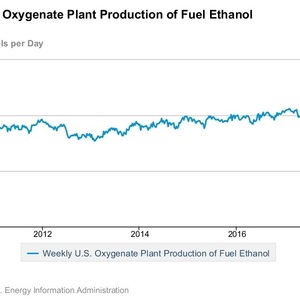EIA maintains 2018, 2019 ethanol production forecasts

U.S. Energy Information Administration
August 7, 2018
BY Erin Krueger
The U.S. Energy Information Administration has released the August edition of its Short-Term Energy Outlook, maintaining its July prediction that ethanol production will average 1.04 billion barrels per day in both 2018 and 2019, up from an average of 1.03 million barrels per day last year.
On a quarterly basis, the EIA forecasts that ethanol production will average 1.05 million barrels per day during the third quarter of this year, falling to 1.04 million barrels per day during the fourth quarter of this year. In 2019, the EIA currently predicts ethanol production will average 1.03 million barrels per day during the first three months of the year, increasing to 1.04 million barrels per day during the second, third and fourth quarters.
Consumption of fuel ethanol is expected to average 950,000 barrels per day in 2018 and 2019, up from 940,000 barrels per day in 2017.
Advertisement
Advertisement
The EIA’s most recent weekly data shows ethanol production reached 1.064 million barrels per day the week ending July 27, down from 1.074 million barrels per day the previous week. The EIA’s most recently monthly data shows the U.S. exported 2.28 million barrels of ethanol in May, primarily to Canada, Peru, and the Philippines.
Advertisement
Advertisement
Related Stories
The U.S. Department of Energy’s Office of Energy Efficiency and Renewable Energy is soliciting public comments on a preliminary plan for determining provisional emissions rates (PER) for the purposes of the 45Z clean fuel production credit.
On July 17, Iowa’s cost-share Renewable Fuels Infrastructure Program awarded $1.12 million in grants for 20 applicants to add B11 and 4 applicants to add E15 to retail sites. This was the first meeting following the start of RFIP’s fiscal year.
Par Pacific Holdings Inc., Mitsubishi Corp. and ENEOS Corp. on July 21 announced the signing of definitive agreements to establish Hawaii Renewables LLC, a joint venture to produce renewable fuels at Par Pacific’s refinery in Kapolei Hawaii.
A new study published by the ABFA finds that the U.S. EPA’s proposal to cut the RIN by 50% for fuels made from foreign feedstocks, as part of its 2026 and 2027 RVOs, could stall the growth of the biomass-based diesel (BBD) industry.
The European Commission on July 18 announced its investigation into biodiesel imports from China is now complete and did not confirm the existence of fraud. The commission will take action, however, to address some systemic weaknesses it identified.
Upcoming Events










